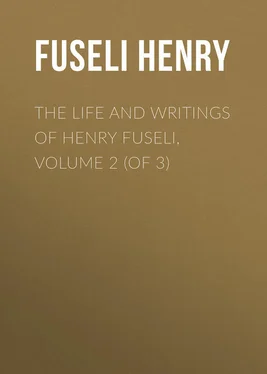Henry Fuseli - The Life and Writings of Henry Fuseli, Volume 2 (of 3)
Здесь есть возможность читать онлайн «Henry Fuseli - The Life and Writings of Henry Fuseli, Volume 2 (of 3)» — ознакомительный отрывок электронной книги совершенно бесплатно, а после прочтения отрывка купить полную версию. В некоторых случаях можно слушать аудио, скачать через торрент в формате fb2 и присутствует краткое содержание. Жанр: visual_arts, foreign_antique, foreign_prose, на английском языке. Описание произведения, (предисловие) а так же отзывы посетителей доступны на портале библиотеки ЛибКат.
- Название:The Life and Writings of Henry Fuseli, Volume 2 (of 3)
- Автор:
- Жанр:
- Год:неизвестен
- ISBN:нет данных
- Рейтинг книги:5 / 5. Голосов: 1
-
Избранное:Добавить в избранное
- Отзывы:
-
Ваша оценка:
- 100
- 1
- 2
- 3
- 4
- 5
The Life and Writings of Henry Fuseli, Volume 2 (of 3): краткое содержание, описание и аннотация
Предлагаем к чтению аннотацию, описание, краткое содержание или предисловие (зависит от того, что написал сам автор книги «The Life and Writings of Henry Fuseli, Volume 2 (of 3)»). Если вы не нашли необходимую информацию о книге — напишите в комментариях, мы постараемся отыскать её.
The Life and Writings of Henry Fuseli, Volume 2 (of 3) — читать онлайн ознакомительный отрывок
Ниже представлен текст книги, разбитый по страницам. Система сохранения места последней прочитанной страницы, позволяет с удобством читать онлайн бесплатно книгу «The Life and Writings of Henry Fuseli, Volume 2 (of 3)», без необходимости каждый раз заново искать на чём Вы остановились. Поставьте закладку, и сможете в любой момент перейти на страницу, на которой закончили чтение.
Интервал:
Закладка:
The subject of Timanthes was the immolation of Iphigenia; Iphigenia was the principal figure, and her form, her resignation, or her anguish the painter's principal task; the figure of Agamemnon, however important, is merely accessory, and no more necessary to make the subject a completely tragic one, than that of Clytemnestra the mother, no more than that of Priam, to impress us with sympathy at the death of Polyxena. It is therefore a misnomer of the French critic, to call Agamemnon 'the hero' of the subject.
Neither the French nor the English critic appears to me to have comprehended the real motive of Timanthes, as contained in the words, ' decere, pro dignitate , and digne ,' in the passages of Tully, Quintilian, and Pliny; 17 17 Cicero Oratore , 73. seq. – In alioque ponatur, aliudque totum sit, utrum decere an oportere dicas; oportere enim, perfectionem declarat officii, quo et semper utendum est, et omnibus: decere , quasi aptum esse, consentaneumque tempori et personæ; quod cum in factis sæpissime, tum in dictis valet, in vultu denique, et gestu, et incessu. Contraque item dedecere . Quod si poeta fugit, ut maximum vitium, qui peccat, etiam, cum probam orationem affingit improbo, stultove sapientis: si denique pictor ille vidit, cum immolanda Iphigenia tristis Calchas esset, mæstior Ulysses, mæreret Menelaus, obvolvendum caput Agamemnonis esse, quoniam summum illum luctum penicillo, non posset imitari: si denique histrio, quid deceat quærit: quid faciendum oratori putemus? M. F. Quintilianus, l. ii. c. 14. – Operienda sunt quædam, sive ostendi non debent, sive exprimi pro dignitate non possunt: ut fecit Timanthes, ut opinor, Cithnius, in ea tabula qua Coloten Tejum vicit. Nam cum in Iphigeniæ immolatione pinxisset tristem Calchantem, tristiorem Ulyssem, addidisset Menelao quem summum poterat ars efficere mærorem, consumptis affectibus, non reperiens quo dignè modo Patris vultum possit exprimere, velavit ejus caput, et sui cuique animo dedit æstimandum. It is evident to the slightest consideration, that both Cicero and Quintilian lose sight of their premises, and contradict themselves in the motive they ascribe to Timanthes. Their want of acquaintance with the nature of plastic expression made them imagine the face of Agamemnon beyond the power of the artist. They were not aware that by making him waste expression on inferior actors at the expence of a principal one, they call him an improvident spendthrift and not a wise œconomist. From Valerius Maximus, who calls the subject 'Luctuosum immolatæ Iphigeniæ sacrificium' instead of immolandæ, little can be expected to the purpose. Pliny, with the dignè of Quintilian has the same confusion of motive.
they ascribe to impotence what was the forbearance of judgment; Timanthes felt like a father: he did not hide the face of Agamemnon, because it was beyond the power of his art, not because it was beyond the possibility , but because it was beyond the dignity of expression, because the inspiring feature of paternal affection at that moment, and the action which of necessity must have accompanied it, would either have destroyed the grandeur of the character and the solemnity of the scene, or subjected the painter with the majority of his judges to the imputation of insensibility. He must either have represented him in tears, or convulsed at the flash of the raised dagger, forgetting the chief in the father, or shown him absorbed by despair, and in that state of stupefaction, which levels all features and deadens expression; he might indeed have chosen a fourth mode, he might have exhibited him fainting and palsied in the arms of his attendants, and by this confusion of male and female character, merited the applause of every theatre at Paris. But Timanthes had too true a sense of nature to expose a father's feelings or to tear a passion to rags; nor had the Greeks yet learnt of Rome to steel the face. If he made Agamemnon bear his calamity as a man, he made him also feel it as a man. It became the leader of Greece to sanction the ceremony with his presence, it did not become the father to see his daughter beneath the dagger's point: the same nature that threw a real mantle over the face of Timoleon, when he assisted at the punishment of his brother, taught Timanthes to throw an imaginary one over the face of Agamemnon; neither height nor depth, propriety of expression was his aim.
The critic grants that the expedient of Timanthes may be allowed in 'instances of blood,' the supported aspect of which would change a scene of commiseration and terror into one of abomination and horror, which ought for ever to be excluded from the province of art, of poetry as well as painting: and would not the face of Agamemnon, uncovered, have had this effect? was not the scene he must have witnessed a scene of blood? and whose blood was to be shed? that of his own daughter – and what daughter? young, beautiful, helpless, innocent, resigned, – the very idea of resignation in such a victim, must either have acted irresistibly to procure her relief, or thrown a veil over a father's face. A man who is determined to sport wit at the expence of heart alone could call such an expedient ridiculous – 'as ridiculous,' Mr. Falconet continues, 'as a poet would be, who in a pathetic situation, instead of satisfying my expectation, to rid himself of the business, should say, that the sentiments of his hero are so far above whatever can be said on the occasion, that he shall say nothing.' And has not Homer, though he does not tell us this, acted upon a similar principle? has he not, when Ulysses addresses Ajax in Hades, in the most pathetic and conciliatory manner, instead of furnishing him with an answer, made him remain in indignant silence during the address, then turn his step and stalk away? has not the universal voice of genuine criticism with Longinus told us, and if it had not, would not Nature's own voice tell us, that that silence was characteristic, that it precluded, included, and soaring above all answer, consigned Ulysses for ever to a sense of inferiority? Nor is it necessary to render such criticism contemptible to mention the silence of Dido in Virgil, or the Niobe of Æschylus, who was introduced veiled, and continued mute during her presence on the stage.
But in hiding Agamemnon's face, Timanthes loses the honour of invention, as he is merely the imitator of Euripides, who did it before him? 18 18 It is observed by an ingenious Critic, that in the tragedy of Euripides, the procession is described, and upon Iphigenia's looking back on her father, he groans, and hides his face to conceal his tears; whilst the picture gives the moment that precedes the sacrifice, and the hiding has a different object and arises from another impression. – ὡς δ' εσειδεν Αγαμεμνων αναξ ἐπι σφαγας στειχουσαν εἰς ἀλσος κορην ἀνεστεναξε. Καμπαλιν στρεψας καρα Δακρυα προηγεν. ὀμματων πεπλον προθεις.
I am not prepared with chronologic proofs to decide whether Euripides or Timanthes, who were contemporaries, about the period of the Peloponnesian war, fell first on this expedient; though the silence of Pliny and Quintilian on that head, seems to be in favour of the painter, neither of whom could be ignorant of the celebrated drama of Euripides, and would not willingly have suffered the honour of this master-stroke of an art they were so much better acquainted with than painting, to be transferred to another from its real author, had the poet's claim been prior: nor shall I urge that the picture of Timanthes was crowned with victory by those who were in daily habits of assisting at the dramas of Euripides, without having their verdict impeached by Colotes or his friends, who would not have failed to avail themselves of so flagrant a proof of inferiority as the want of invention, in the work of his rival: – I shall only ask, what is invention? if it be the combination of the most important moment of a fact with the most varied effects of the reigning passion on the characters introduced – the invention of Timanthes consisted in showing, by the gradation of that passion in the faces of the assistant mourners, the reason why that of the principal one, was hid . This he performed, and this the poet, whether prior or subsequent, did not and could not do, but left it with a silent appeal to our own mind and fancy.
Интервал:
Закладка:
Похожие книги на «The Life and Writings of Henry Fuseli, Volume 2 (of 3)»
Представляем Вашему вниманию похожие книги на «The Life and Writings of Henry Fuseli, Volume 2 (of 3)» списком для выбора. Мы отобрали схожую по названию и смыслу литературу в надежде предоставить читателям больше вариантов отыскать новые, интересные, ещё непрочитанные произведения.
Обсуждение, отзывы о книге «The Life and Writings of Henry Fuseli, Volume 2 (of 3)» и просто собственные мнения читателей. Оставьте ваши комментарии, напишите, что Вы думаете о произведении, его смысле или главных героях. Укажите что конкретно понравилось, а что нет, и почему Вы так считаете.












